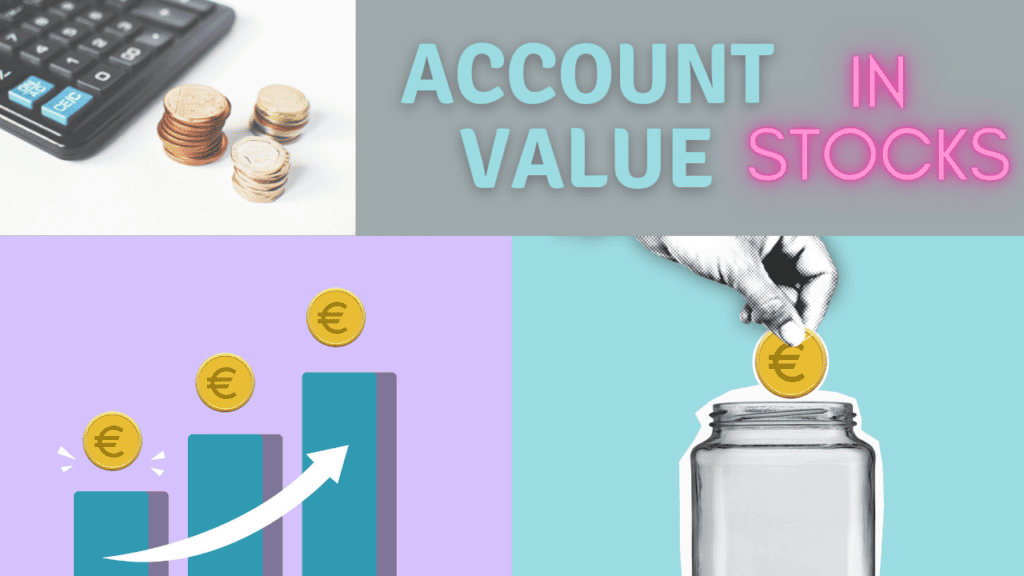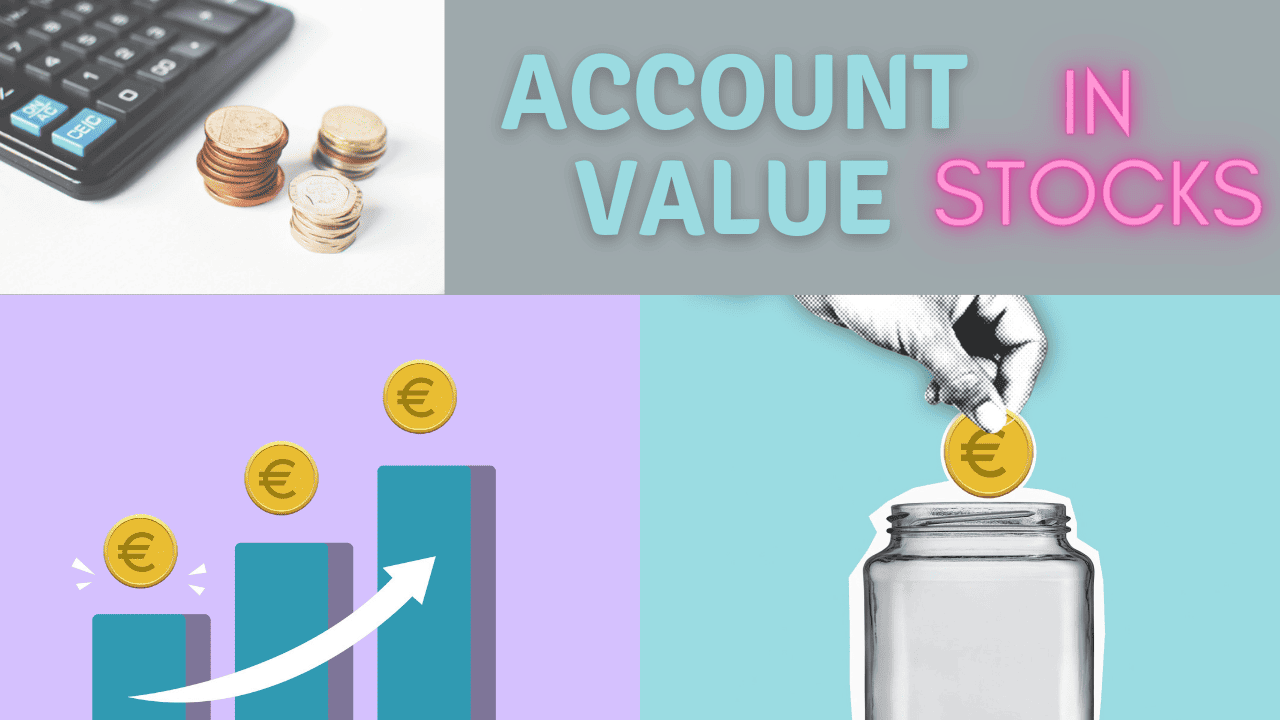
Table of Contents
Introduction:
Welcome to moneyorbis! In this article we know about Account Value in Stocks. In the world of investing, especially stocks, understanding account value is paramount. It serves as an important metric that reflects the overall value of an investment portfolio. Whether you are an experienced investor or just starting your journey in the financial markets, it is essential to understand what account value represents and how it is affected by various factors. In this comprehensive guide, we will learn in detail about the concept of account value in stocks, its importance, how it is calculated, and the factors that affect it.
Defining Account Value:
Account value refers to the total value of an investment account, including the combined value of all securities held within it, such as stocks, bonds, mutual funds, ETFs, and any other assets. It provides investors with a snapshot of the overall performance and value of their investment portfolio at a given point in time. Account value is dynamic and fluctuates based on changes in the market value of the securities held in the account.
Calculation of Account Value in Stocks:
To calculate the account value, the market value of all securities held in the investment account must be added up. The market value is determined by multiplying the current market value of each security by the amount held. Additionally, any cash or cash equivalents held in the account, such as dividends received but not reinvested, must be included in the calculation. The sum of these components gives the account value.
Significance of Account Value in Stocks:
Account value serves as a key performance indicator for investors, helping them assess the success of their investment strategies. It allows investors to track the growth or decline of their investment portfolio over time and make informed decisions about asset allocation and portfolio rebalancing. Knowing the account value helps investors evaluate their progress towards achieving their financial goals, whether it is retirement savings, wealth accumulation or raising funds for other life purposes.
Factors Influencing Account Value in Stocks:
- Market performance: Fluctuations in the stock market directly affect the account’s value. Bullish markets tend to increase the account’s value, while bearish markets can cause a decline.
- Individual stock performance: The performance of specific stocks held in the portfolio significantly affects the account’s value. Gains or losses in stock prices directly affect the overall value of the investment account.
- Dividends and interest: Income generated from dividends on stocks or interest on bonds contributes to the account’s value. Reinvestment of dividends can further drive long-term growth.
- Economic indicators: Macroeconomic factors such as interest rates, inflation, GDP growth, and geopolitical events can affect market sentiment and, consequently, the account’s value.
- Investor behavior: Factors such as buying and selling decisions, portfolio diversification, risk tolerance, and time horizon affect the account’s value. Emotional reactions to market fluctuations can lead to impulsive actions that impact long-term performance.
Strategies for Maximizing Account Value in Stocks:
- Diversification: Spreading investments across different asset classes and sectors helps reduce risk and increase potential returns, thereby supporting account value growth.
- Regular monitoring: Tracking account value and periodically reviewing investment performance allows investors to make timely adjustments to their portfolios as needed.
- Long-term perspective: Taking a patient, long-term approach to investing can help weather market volatility and take advantage of compounding returns to maximize account value over time.
- Rebalancing: Periodically rebalancing a portfolio to maintain desired asset allocation goals ensures alignment with investment objectives and helps optimize account value.
- Dollar-cost averaging: Investing a fixed amount at regular intervals, regardless of market conditions, can help mitigate market volatility and potentially increase account value accumulation.
Conclusion:
In conclusion, account value is not just a number; it reflects the culmination of investment decisions, market dynamics, and economic factors. It serves as a barometer of financial health and progress toward achieving investment objectives. Embracing a holistic understanding of account value gives investors the knowledge and tools they need to navigate the complexities of the stock market and build wealth over the long term.
FAQ: Understanding Account Value in Stocks
What is account value in the context of stock investing?
Account value is the total monetary value of all investments and cash held in a brokerage or investment account. It includes the market value of stocks, bonds, mutual funds, ETFs, and any cash or cash equivalents. It reflects the current financial position of an investor’s portfolio.
How is account value different from purchasing power?
Account value refers to the total value of all assets in an investment account. Buying power, on the other hand, refers to the amount of money the investor has available to purchase additional securities. Buying power can be affected by account value, but it also includes available margin, unsettled funds, and other factors.
How are taxes related to account value?
Taxes are not directly related to the account value, but rather to capital gains and dividends from investments within the account. Investors are generally taxed on realized gains (from the sale of investments at a profit) and dividends received, which can affect the cash component of the account value.
How often should an investor check his account value?
How often an investor should check his account value can vary depending on personal preference, investment strategy, and market conditions. While some people may prefer to monitor their investments daily or weekly, others may take a more long-term approach and check less frequently. However, it is essential not to make reactive decisions based on short-term market fluctuations and to focus on long-term investment goals.
Can account value affect the ability to trade?
In some cases, account value may affect the ability to trade, particularly in accounts that use margin or have minimum balance requirements. For example, a significant drop in account value may lead to a margin call, requiring the investor to deposit additional funds or sell securities to maintain the account’s margin requirements.
Can account value fluctuate daily?
Yes, account value can fluctuate daily due to changes in the market value of securities held in the account. Stock prices, bond yields, and other investment values constantly change with market conditions, which directly impacts overall account value.
Why is it important for investors to understand account value?
Understanding account value is important because it provides a snapshot of an investor’s financial position within the market. It helps make informed decisions about assessing investment performance, buying or selling securities, rebalancing portfolios, and tracking progress toward financial goals.
Does the account value include dividends earned from stocks?
Yes, the account value includes dividends earned from stocks, if those dividends are deposited into the account as cash. If dividends are automatically reinvested to buy more shares (a common option known as a DRIP or dividend reinvestment plan), the value of those additional shares will also contribute to the account value.
How can investors protect or enhance their account value in volatile markets?
To protect or enhance account value in volatile markets, investors can consider strategies such as diversification to spread risk, rebalancing to maintain the desired asset allocation, dollar-cost averaging to minimize the impact of volatility, and maintaining a long-term view to cope with short-term market fluctuations. It is also important to stay informed and avoid making impulsive decisions based on short-term market movements.
Read More:
- List of All Stock and Security Exchanges in Brazil
- List of Stock and Security Exchanges in United States
- List of Stock and Security Exchanges in Australia 2024
- List of Stock and Security Exchanges in India
- Dow Jones Index Stocks List and classification
- Nyse Energy Sector Best Dividend Stocks in 2024
- Top 5 Energy Sector Highest Dividend Giving Stocks in NASDAQ

